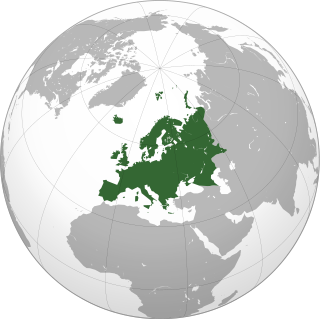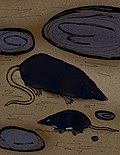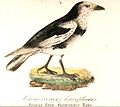Top Qs
Timeline
Chat
Perspective
List of European species extinct in the Holocene
From Wikipedia, the free encyclopedia
Remove ads
This is a list of European species extinct in the Holocene that covers extinctions from the Holocene epoch, a geologic epoch that began about 11,650 years before present (about 9700 BCE)[A] and continues to the present day.[1]
It has been suggested that List of Corsica, Sardinia, and Sicily animals extinct in the Holocene be merged into this article. (Discuss) Proposed since September 2025. |

This list includes the European continent and its surrounding islands. All large islands in the Mediterranean Sea are included except for Cyprus, which is in the List of Asian animals extinct in the Holocene. The recently extinct animals of the Macaronesian islands in the North Atlantic are listed separately. The three Caucasian republics of Georgia, Azerbaijan, and Armenia are included, even though their territory may fall partially or fully in Asia depending on the definition of Europe considered.
Overseas territories, departments, and constituent countries of European countries are not included here; they are found on the lists pertaining to their respective regions. For example, French Polynesia is grouped with Oceania, Martinique is grouped with the West Indies, and Réunion is grouped with Madagascar and the Indian Ocean islands, despite all of them being politically part of France.
Many extinction dates are unknown due to a lack of relevant information.
Remove ads
Mammals (class Mammalia)
Summarize
Perspective
Elephant-like mammals (order Proboscidea)
Elephants and mammoths (family Elephantidae)
Lagomorphs (order Lagomorpha)
Rabbits and hares (family Leporidae)
Pikas (family Ochotonidae)
Locally extinct
Rodents (order Rodentia)
Hamsters, voles, lemmings, muskrats, and New World rats and mice (family Cricetidae)
Old World rats and mice (family Muridae)
Dormice (family Gliridae)
Squirrels (family Sciuridae)
True insectivores (order Eulipotyphla)
True shrews (family Soricidae)
Carnivorans (order Carnivora)
Cats (family Felidae)
Locally extinct
Hyenas (family Hyaenidae)
Dogs (family Canidae)
Martens, polecats, otters, badgers, and weasels (family Mustelidae)
Odd-toed ungulates (order Perissodactyla)
Horses and allies (family Equidae)
Locally extinct
Rhinoceroses (family Rhinocerotidae)
Even-toed ungulates (order Artiodactyla)
Right and bowhead whales (family Balaenidae)
Locally extinct
Gray whales (family Eschrichtiidae)
Locally extinct
True deer (family Cervidae)
Locally extinct
Cattle, goats, antelopes, and others (family Bovidae)
Extinct in the wild
Locally extinct
Remove ads
Birds (class Aves)
Rails and cranes (order Gruiformes)
Rails (family Rallidae)
Shorebirds (order Charadriiformes)
Sandpipers (family Scolopacidae)
Auks (family Alcidae)
Buttonquails (family Turnicidae)
Locally extinct
Pelicans, herons, and ibises (order Pelecaniformes)
Ibises and spoonbills (family Threskiornithidae)
Locally extinct
Hawks and relatives (order Accipitriformes)
Hawks, eagles, kites, harriers and Old World vultures (family Accipitridae)
Owls (order Strigiformes)
True owls (family Strigidae)
Locally extinct
Perching birds (order Passeriformes)
Crows and relatives (family Corvidae)
Remove ads
Reptiles (class Reptilia)
Squamates (order Squamata)
Wall lizards (family Lacertidae)
Vipers (family Viperidae)
Locally extinct
Ray-finned fish (class Actinopterygii)
Sturgeons and paddlefishes (order Acipenseriformes)
Sturgeons (family Acipenseridae)
Locally extinct
Minnows and allies (order Cypriniformes)
Carps, minnows, and relatives (family Cyprinidae)
Salmon, trout and relatives (order Salmoniformes)
Salmon, trout and relatives (family Salmonidae)
Extinct in the wild
Locally extinct
Lionfishes and sculpins (order Scorpaeniformes)
Sticklebacks (family Gasterosteidae)
Remove ads
Cartilaginous fish (class Chondrichthyes)
Shovelnose rays and allies (order Rhinopristiformes)
Sawfishes (family Pristidae)
Locally extinct
Remove ads
Lampreys and relatives (class Hyperoartia)
Lampreys (order Petromyzontiformes)
Northern lampreys (family Petromyzontidae)
Insects (class Insecta)
Praying mantises (order Mantodea)
Family Amelidae
Bark lice, book lice and parasitic lice (order Psocodea)
Mammal lice (family Trichodectidae)
Possibly extinct
Beetles (order Coleoptera)
Predaceous diving beetles (family Dytiscidae)
Butterflies and moths (order Lepidoptera)
Metalmark butterflies (family Riodinidae)
Cosmet moths (family Cosmopterigidae)
Caddisflies (order Trichoptera)
Net-spinning caddisflies (family Hydropsychidae)
Flies and mosquitos (order Diptera)
Long-legged flies (family Dolichopodidae)
Remove ads
Slugs and snails (class Gastropoda)
Order Littorinimorpha
Mud snails (family Hydrobiidae)
Possibly extinct
Order Stylommatophora
True glass snails (family Zonitidae)
Possibly extinct
Family Parmacellidae
Remove ads
Sea anemones, corals, and zoanthids (class Hexacorallia)
Sea anemones (order Actiniaria)
Family Edwardsiidae
Possibly extinct
Plants (kingdom Plantae)
Order Asterales
Sunflowers (family Asteraceae)
Probably extinct
Order Ericales
Primroses (family Ericales)
Extinct in the wild
Order Poales
True grasses (family Poaceae)
Extinct in the wild
Remove ads
See also
Notes
- The source gives "11,700 calendar yr b2k (before CE 2000)". But "BP" means "before CE 1950". Therefore, the Holocene began 11,650 BP. Doing the math, that is c. 9700 BCE.
- A. corsicanus was originally applied to remains from Corsica and A. similis to Sardinia. It was later recognized that A. corsicanus existed in the early Pleistocene of both islands, and A. similis in the late Pleistocene-Holocene, as seen in Moncunill-Sole et al. (2016).
References
External links
Wikiwand - on
Seamless Wikipedia browsing. On steroids.
Remove ads



























































